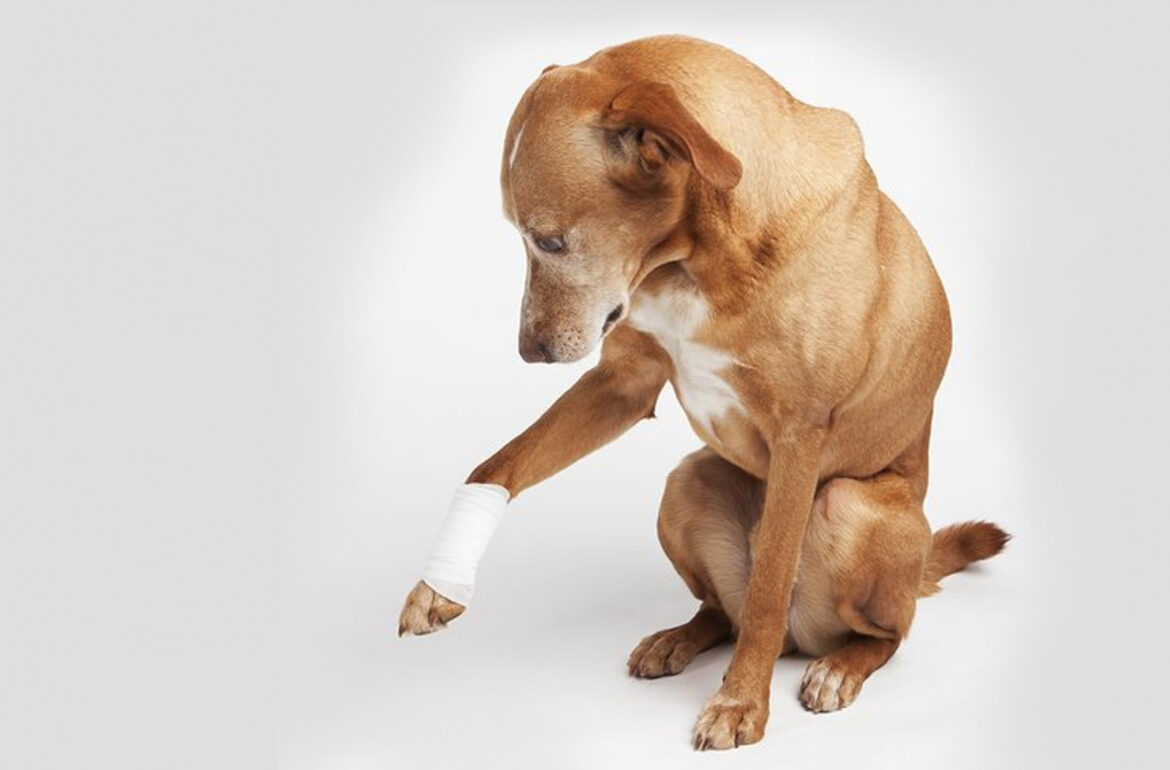Natural Treatments For Your Pet’s Minor Wounds At Home

Even under the most watchful eye, accidents can happen to our dogs and cats resulting in scratches, scrapes and burns.
Whether it’s due to a rough and tumble play session at the dog park or a shiny and extremely hot kettle resulting in a scalded kitty paw pad, when accidents happen it is vital to quickly assess the situation while remaining calm as our pets can pick up on our stress levels.
If your pet’s wound is not serious (deep bite, fracture, open gash that requires stitching, bleeding that cannot be stopped, etc.,), you can consider treating your dog or cat’s minor wounds naturally and effectively with simple home remedies such as treatment salves and sprays that can be prepared easily.
Natural Wound Healing Salve Recipe For Your Pet
What you’ll need:
- Safe healing herbs of your choice
- Carrier oil (extra virgin olive oil, coconut oil, jojoba oil, sweet almond oil)
- Small glass jar
Wound healing herbs for pets
Here are a few natural herbs that are very handy to have at home. Use them to make your own wound healing salve that can be applied on both your pet and yourself.

- Comfrey (Symphytum officinale) leaves
Comfrey is commonly incorporated into the wound-healing kit because it contains allantoin[1], a stimulant for cell growth. It helps the skin’s tissues regenerate quickly.

- Calendula(Calendula officinalis) flowers
The flower of the calendula plant has anti-inflammatory, antimicrobial, antifungal properties which are beneficial to accelerate wound healing. Research as shown that an increase in glycoproteins and collagen[2] was observed in wound sites treated with calendula.

- Lavender (Lavandula angustifolia) leaves and flowers
Notably, lavender is used to help reduce itchiness that is caused by a release of histamines from your pet’s body as a natural response to any injury. The scent of lavender can also help to calm and soothe your buddy’s nerves[3].

- Chamomile (German, Roman), used mainly for dogs
German chamomile or Roman chamomile is anti-inflammatory and is also said to be nature’s aspirin as it has muscle relaxant properties[4].
Step-by-step tutorial on how to make a treatment salve for minor wounds on your dog and cat:
Step 1: Fill ¾ of the jar with dried herbs.
Step 2: Pour carrier oil (e.g. jojoba oil, sweet almond oil, coconut oil and rosehip oil) into the same jar and close the lid tightly. You can pour a 50:25:25 blend of extra virgin olive oil with two other carrier oils of your choice to extend the shelf life of your salve. Otherwise, you can just opt for extra virgin olive oil, but use an even smaller jar.
Step 3: Leave the jar in a cool, dark place (e.g., your storeroom or back of your wardrobe). Let the mixture steep for 5-6 weeks before using.
How To Treat Pet Wounds At Home
Step 1: For bleeding wounds, it is important to stop the bleeding by applying consistent pressure for about 5-10 minutes until the bleeding stops. If you have a furry dog or cat and the wound area is hard to reach, part the fur around the site of the wound and trim down the fur on both sides as close to the skin as possible.
Step 2: Rinse the wound site with clean running water for another 3-5 minutes to get any debris out and prevent potential bacteria build up. If your pet has sustained a burn, this step is also applicable as rinsing burned skin can help lower the amount of pain your buddy’s experiencing and stops the burn from becoming more serious. Avoid using ice on burnt skin. As ice is extremely cold, it can actually cause shock and damage to the skin tissue and increase your pet’s risk of an infection.
Step 3: Gently dab the area with a light gauze or small washcloth to dry the wound. Avoid using cotton wool or cotton pads as the fluffy wool strands may get stuck to the wound.
Step 4: Apply a generous layer of natural salve on the wound to help with healing and then wrap with a layer of gauze, followed by a waterproof dressing.
Tip: To prevent your pet from licking away the salve, especially during the first 2-3 days, you may want to consider letting them wear a soft, inflatable collar, T-shirt or protective sock that will prevent them from reaching their wound.
Daily Wound Upkeeping
Change the wound dressing for your pet daily and clean it with a simple rinse of either apple cider vinegar or unrefined sea salt (Himalayan Sea salt or Celtic Sea salt) mixed with water before applying a fresh layer of salve.
Apple cider vinegar rinse
- 1 tablespoon of unfiltered apple cider vinegar
- 1 cup of filtered water
Sea salt rinse
- 2 tablespoons unrefined sea salt
- ½ cup of filtered water
A properly cleaned and treated minor wound should heal within three to seven days. However, in the event that you notice signs of infection such as redness, pus or swelling, please consult with your vet immediately.
References
[1] https://www.sciencedirect.com/topics/pharmacology-toxicology-and-pharmaceutical-science/comfrey#:~:text=Comfrey%20(Symphytum%20officinale)%20acts%20as,promote%20wound%20and%20bone%20healings.
[2] https://www.sciencedirect.com/topics/pharmacology-toxicology-and-pharmaceutical-science/calendula
[3] https://avmajournals.avma.org/view/journals/ajvr/70/6/ajvr.70.6.764.xml
[4] https://vcahospitals.com/know-your-pet/chamomile#:~:text=Chamomile%20(Matricaria%20recutita)%20is%20an,inflammatory%2C%20and%20a%20muscle%20relaxant.&text=While%20many%20supplements%20are%20sold,be%20managed%20by%20your%20veterinarian.




